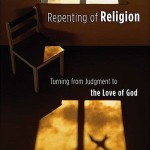We run our website the way we wished the whole internet worked: we provide high quality original content with no ads. We are funded solely by your direct support. Please consider supporting this project.

Do All Roads Lead to God?
First, if it’s really true that Jesus is the way to Father and that no one comes to the Father except through him, (Jn 14:6) then it seems that no other religious leader or religious doctrine can bring us to the Father. “The” is a definite article, and it implies singularity. “A dog” could refer to one of any number of dogs. But “the dog” can only refer to one particular dog. If Jesus is the Lord and Savior and the way to the Father, he’s the only one there is.
This isn’t what most people in our relativistic, post-modern age want to hear. I, on occasion, give talks or participate in debates on secular university campuses around the country on issues related to the historical Jesus. Whenever I stand by the claim that Jesus is the only way to God I am confronted with a certain amount of hostility. To think there’s only one way to God, I am often told, is arrogant, ignorant, intolerant and dangerous. Everyone knows these days that there are many ways to God, at least for people who are sincere in what they believe.
What’s odd is that no one has ever been able to provide me with cogent arguments defending this position. When I’ve asked for some, as often as not people have simply stared at me in disbelief, offended at the suggestion that truths this obvious would need supporting arguments.
Always beware when any of your beliefs are so “obviously true” you think they don’t need supporting evidence or arguments. This the way brainwashed people think!
Another thing that’s odd about the prevailing relativistic attitude today is that it’s not clear why believing many roads lead to God is any more open minded than believing only one does. The prevailing attitude seems to confuse the content of what someone believes with the way they believe it.
Think about it. A belief is true if it reflects the way reality is, false if it doesn’t. On all questions of truth, therefore, there is ultimately only one right answer, for there is ultimately only one reality. Conversely, there are an infinite number of possible wrong answers. If someone insists that there isn’t “one reality,” arguing instead that there are as many different realities as there are people, I would simply respond by pointing out that they just made a truth claim about ultimate reality (not just their reality). What’s ultimately real, in their view, is that there are as many different realities as there are people. And this view is either true (if it corresponds with the way reality is) or false (if it doesn’t).
As a matter of fact, this claim can’t possibly correspond with reality, for the claim is actually self-contradictory. It makes a claim about ultimate reality while denying there is an ultimate reality.
The bottom line is that there is only one way the world is, and the set of true statements are those – and only those — that reflect this one way. So the content of what one believes about reality will always necessarily be narrow. Even the truth claim that all roads lead to God is actually a very narrow claim. Either this claim reflects reality or it doesn’t. Either it’s true or it’s false. This has to be decided on the basis of available evidence and relevant arguments. But the claim itself is no less narrow than the claim that there’s only one way to God, or three, or seven, etc…. In other words, the claim that all roads lead to God rules out an infinite number of alternative claims, just as every other truth claim does.
What makes a person open or closed-minded is not the content of what they believe, but how they arrive at and hold to the (always narrow and exclusive) content of what they believe. Do they arrive at and defend their beliefs with an open or closed mind?
A person who arrived at their beliefs through thoughtful and critical reflection and who is willing to subject their truth claims to the critical scrutiny of others is an open-minded person – regardless of the content of what they believe. On the other hand, a person who simply appropriates and defends a belief – like, “All roads lead to God” – simply because it’s part of the cultural atmosphere they breath is a narrow-minded person, despite the apparent (but illusory) openness of what they believe.
The fact that the “all-roads-lead-to-God” believer may be quick to label dissenters of the cultural mantra “arrogant, intolerant, ignorant and dangerous” instead of calmly reasoning with them simply confirms their narrowness.
My belief that Jesus is the only way to God is admittedly narrow, though no more so than the person who claims there are innumerable ways to God. But I can give evidence and argumentation to defend my truth claim, and I’m perfectly willing to adjust my belief if and when the evidence and/or argumentation call for it. I wish all those who espoused the “all-roads-lead-to-God” mantra shared this attitude.
Image by Matthew Wilkinson via Flickr
Category: Q&A
Tags: Apologetics, Christianity, Debate, God, Jesus, Reasoning, Theology
Topics: Christology, Death and Salvation
Related Reading

Conflicting Pictures of God
In my ongoing reflections on the ReKnew Manifesto, I’ve spent the last two posts (here and here) arguing that nothing is more important in our life than our mental images of God. If so, then the all-important question is: what authority do we trust to tell us what God is like? To most evangelicals, the…

Quotes to Chew on: How First Century Jews Came to Worship a Man
“Legends do not generally arise in contradiction to fundamental convictions held by the culture of those who create and embrace them. Yet if the Jesus story is largely a fictitious legend, this is exactly what we must suppose happened. We submit that the initial historical implausibility of this supposition should be enough for us seriously…

Thankful for the Passion of God
The classical view of God has held that God is impassible, meaning he is above pathos (passion or emotions). The main reason the church came to this view was that, following the Hellenistic philosophical tradition, they associated emotions with change while believing God was above all change (immutable). Moreover, experiencing emotions implies that one is affected by…

Imaging God Rightly: God’s Self-Portrait, Part 3
In the previous two blogs I noted that the vision of God in our minds is the single most important vision in our lives, for it completely determines whether we’ll have a relationship with God and what kind of relationship this will be. A. W. Tozer once wrote, “What comes into our minds when we…

9 Things That Are True of Us When We’re Saved
Image by rAmmoRRison via Flickr The New Testament has many amazing things to say about who we are as believers because of what Christ has done for us. When the Lord saves us, he doesn’t just rescue us from eternal death; he gives us a completely new identity. Consider what happens to us when the Father…

Quotes to Chew on: God’s Love When We Rebel
“Despite the fall and its consequent curse, however, God’s love was not deterred. God is love. God doesn’t stop being God simply because the humans he created have rebelled against him. God does not abandon his goal of having others share in the eternal, ecstatic dance of the Father, Son and Holy Spirit. The world…
